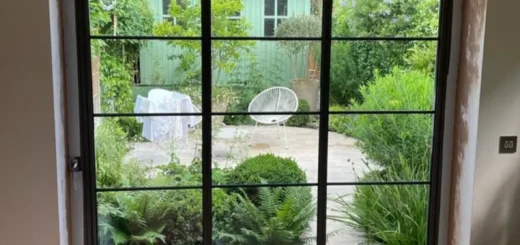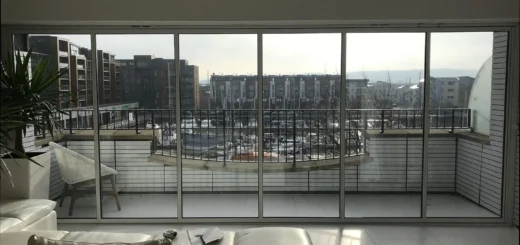A Guide to Aluminium Sliding Patio Doors
Table of Contents
What Are Sliding Patio Doors?
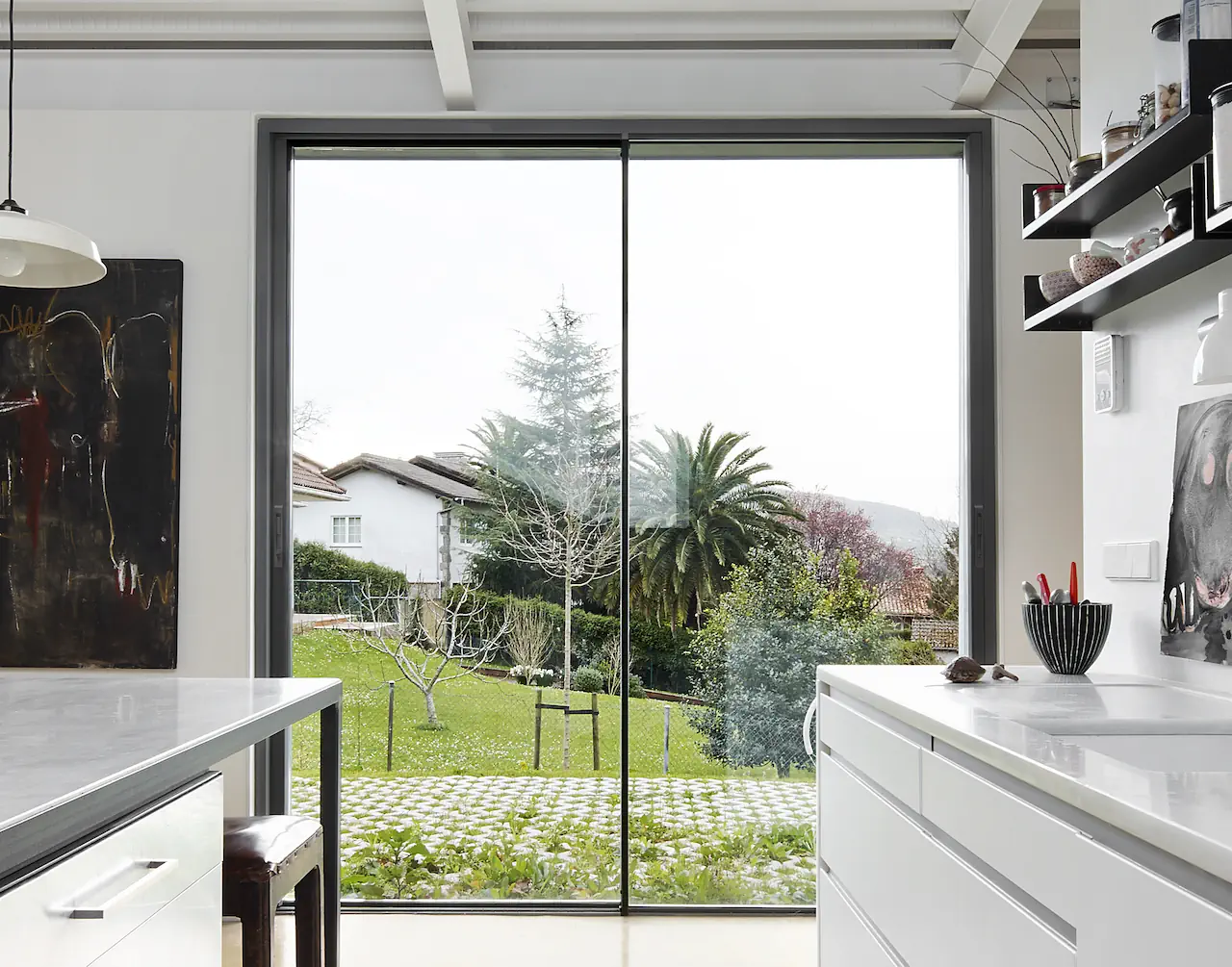
Aluminium sliding patio doors are a common sight in many British homes. These doors use large glass panels that glide along tracks, giving easy access to gardens or patios. Unlike hinged doors, sliding doors don’t swing open, which saves space in both your room and outdoor area.
Many homeowners opt for aluminium sliding patio doors because they’re tough and need little maintenance. The frames are usually thinner than those made from other materials, so you get more glass and less frame. This means more natural light and a better view of your garden. Despite what some might think, modern aluminium doors can be quite good at keeping heat in during winter.
If you’re thinking about new patio doors, whether to replace old ones or as part of a home improvement project, aluminium sliding doors could be a good choice. They suit different types of houses, from period properties to new builds. This guide will explain how these doors work, what to look for when buying them, and how to keep them in good shape once they’re installed.
How They Work
The operation of sliding aluminium patio doors is straightforward. Rollers or wheels attached to the bottom of each panel allow for effortless movement along a track. This design enables even large, heavy glass panels to slide open with minimal effort. Most sliding patio doors feature at least two panels, with one fixed and one mobile. However, configurations with multiple sliding panels are also available, offering greater flexibility in how you use your space.
Key Components of Aluminium Sliding Patio Doors
Frames
The aluminium frames form the structure of the glass doors, holding the glass panels in place. These frames are typically slim yet strong, maximising the glass area while providing robust support.
Glass Panels
Large, double or triple-glazed glass panels make up the bulk of modern patio doors. These panels not only allow light to flood in but also provide insulation against heat and noise.
Tracks
Durable tracks, usually made from aluminium or stainless steel, guide the door panels as they slide. The quality of these tracks plays a major role in the door’s smooth operation over time.
Rollers
High-quality rollers or wheels, often made from nylon or stainless steel, allow the door panels to glide along the tracks. The number and placement of these rollers depend on the size and weight of the door panels.
Locking Mechanism
Secure locking systems are built into the frame, often featuring multi-point locks for added security. Some aluminium sliding patio doors also include additional safety features like anti-lift mechanisms to prevent the door from being forced off its tracks.
Weather Seals
Rubber or brush seals around the edges of the door panels help to keep out drafts, rain, and dust, improving the door’s overall energy efficiency and comfort.
Why Choose Aluminium?
When it comes to slide doors, the choice of material can make a big difference in both appearance and performance. Aluminium sliding patio doors have become increasingly popular due to their unique combination of strength, style, and low maintenance. Let’s explore why aluminium often stands out when compared to other common materials used for patio doors.
Wood: Traditional but High-Maintenance
Wooden sliding patio doors offer a classic, warm look that many homeowners appreciate. However, they come with several drawbacks that might make you think twice. Wood is prone to warping, especially in areas with high humidity or frequent temperature changes. This can lead to doors that stick or don’t close properly. Paint or varnish on wooden doors can peel or fade, requiring regular repainting to maintain their appearance. Wooden frames also need frequent treatment to prevent rot and insect damage, adding to the ongoing maintenance costs.
uPVC: Affordable but Less Durable
uPVC (unplasticized polyvinyl chloride) sliding patio doors are a common choice due to their affordability and low maintenance requirements. However, they have limitations that aluminium sliding patio doors don’t share. uPVC frames can discolour over time, especially when exposed to direct sunlight, losing their crisp white appearance. They’re also less sturdy than aluminium, which means the frames need to be thicker to provide adequate support. This results in less glass area and potentially less natural light in your home. uPVC doors typically have a shorter lifespan than aluminium external doors, which might mean replacing them sooner.
Aluminium: The Modern Choice
Unlike wood, aluminium won’t warp, rot, or be affected by insects. It’s also more durable than uPVC, maintaining its appearance and function for many years with minimal upkeep.
Powder-coated finishes on aluminium sliding patio doors provide a wide range of colour options that resist fading and chipping. This durability means your doors will look good for longer, without the need for repainting. Aluminium’s strength also allows for larger door panels, giving you more flexibility in design and potentially wider openings to your outdoor space.
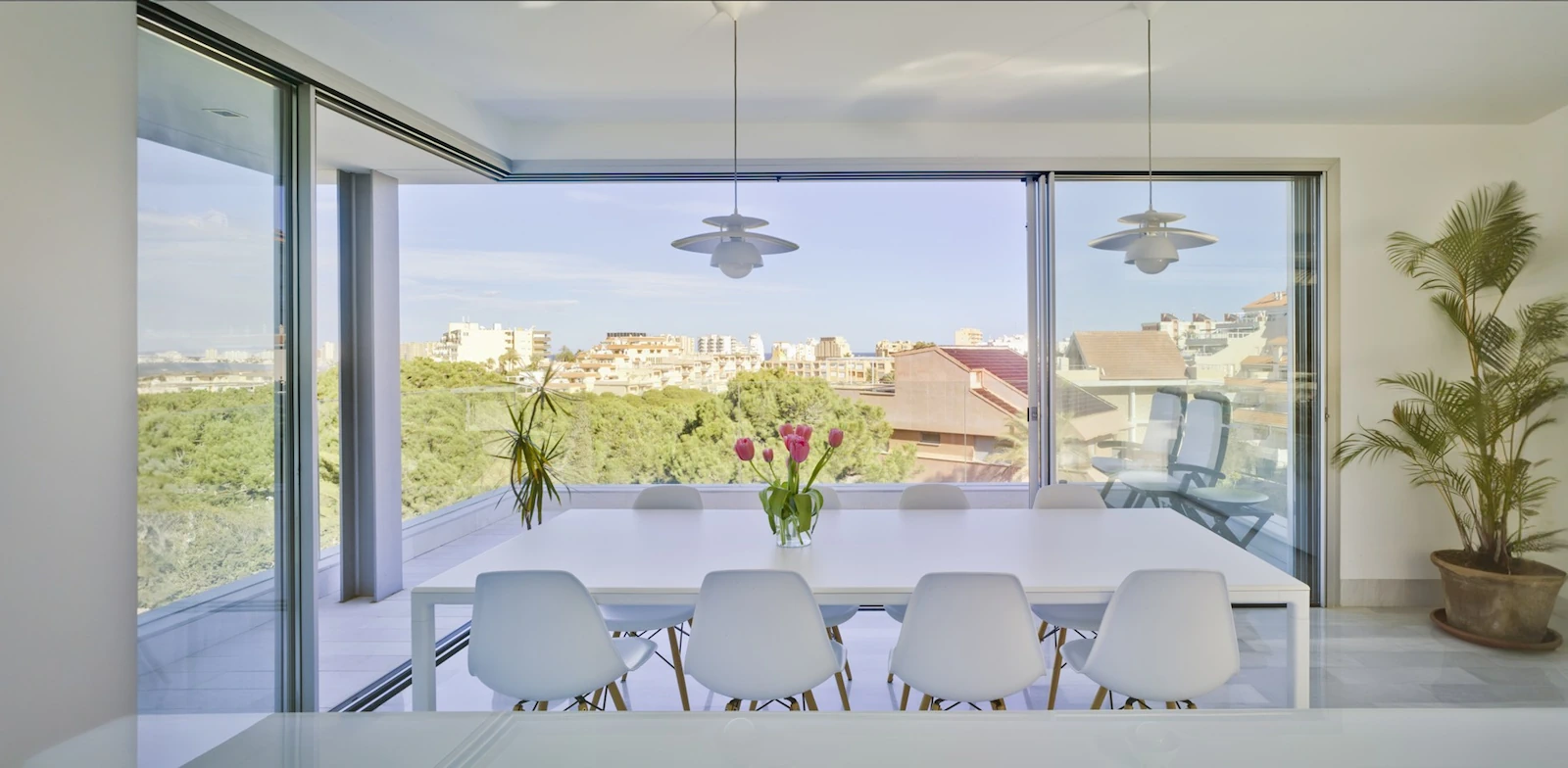
One common misconception about aluminium sliding patio doors is that they might be cold or prone to condensation. However, modern aluminium glass patio doors use thermal break technology, which inserts a poor heat conductor between the inner and outer sections of the frame. This greatly improves the door’s insulation properties, making aluminium sliding patio doors a energy-efficient choice for your home.
Sliding aluminium patio doors are also recyclable, making them an environmentally friendly option. When the time eventually comes to replace them, the aluminium can be recycled without losing quality, reducing the environmental impact of your home improvements.
In terms of security, aluminium patio sliding doors often come out on top. The strength of aluminium allows for robust locking mechanisms to be integrated into the frame. Multi-point locking systems are common, providing excellent security without compromising on the door’s sleek appearance.
Styling Your Aluminium Sliding Doors
Aluminium sliding patio doors offer a wealth of design options to suit various architectural styles and personal preferences. Their adaptability makes them a popular choice for both modern and traditional homes.
Colour Palette
One of the standout features of aluminium sliding patio doors is the wide range of colours available. Powder-coated finishes provide a durable and long-lasting colour that resists fading and chipping. You’re not limited to just white or grey; aluminium patio sliding doors can be finished in virtually any colour you can imagine. This flexibility allows you to match your doors to your home’s exterior or interior colour scheme, or create a striking contrast if you prefer.
For a classic look, many homeowners opt for neutral shades like white, black, or various greys such as anthracite grey. These colours work well with most architectural styles and provide a timeless appeal. However, don’t be afraid to go bold with your aluminium sliding patio doors. Deep blues, rich greens, or even vibrant reds can add a unique touch to your home’s appearance. Some manufacturers offer dual colour options, where the interior and exterior of the frame can be different colours, allowing you to coordinate with both your indoor and outdoor décor. Some manufacturers also offer heritage sliding doors, which mimic some of the features of period doors and windows.
Frame Thickness
The strength of aluminium allows for thinner frames in sliding patio doors compared to other materials like uPVC. This slimline profile is a key aesthetic advantage of aluminium sliding patio doors. Thinner frames mean larger glass areas, which not only look sleek and modern but also allow more natural light into your home. The result is a more open, spacious feel to your living areas.
Some slimline aluminium sliding patio doors feature ultra-slim frames that almost disappear when viewed from certain angles. This minimalist look is particularly popular in contemporary architecture. However, even in more traditional homes, the slim frames of aluminium sliding patio doors can provide a modern touch without overwhelming the existing aesthetic.
Multi-Panel Configurations
The strength and durability of aluminium make it possible to create sliding patio doors in a variety of configurations. Two-panel designs, where one panel slides and one remains fixed, are common and work well in smaller spaces. However, aluminium sliding patio doors can also be designed with multiple panels for wider openings.
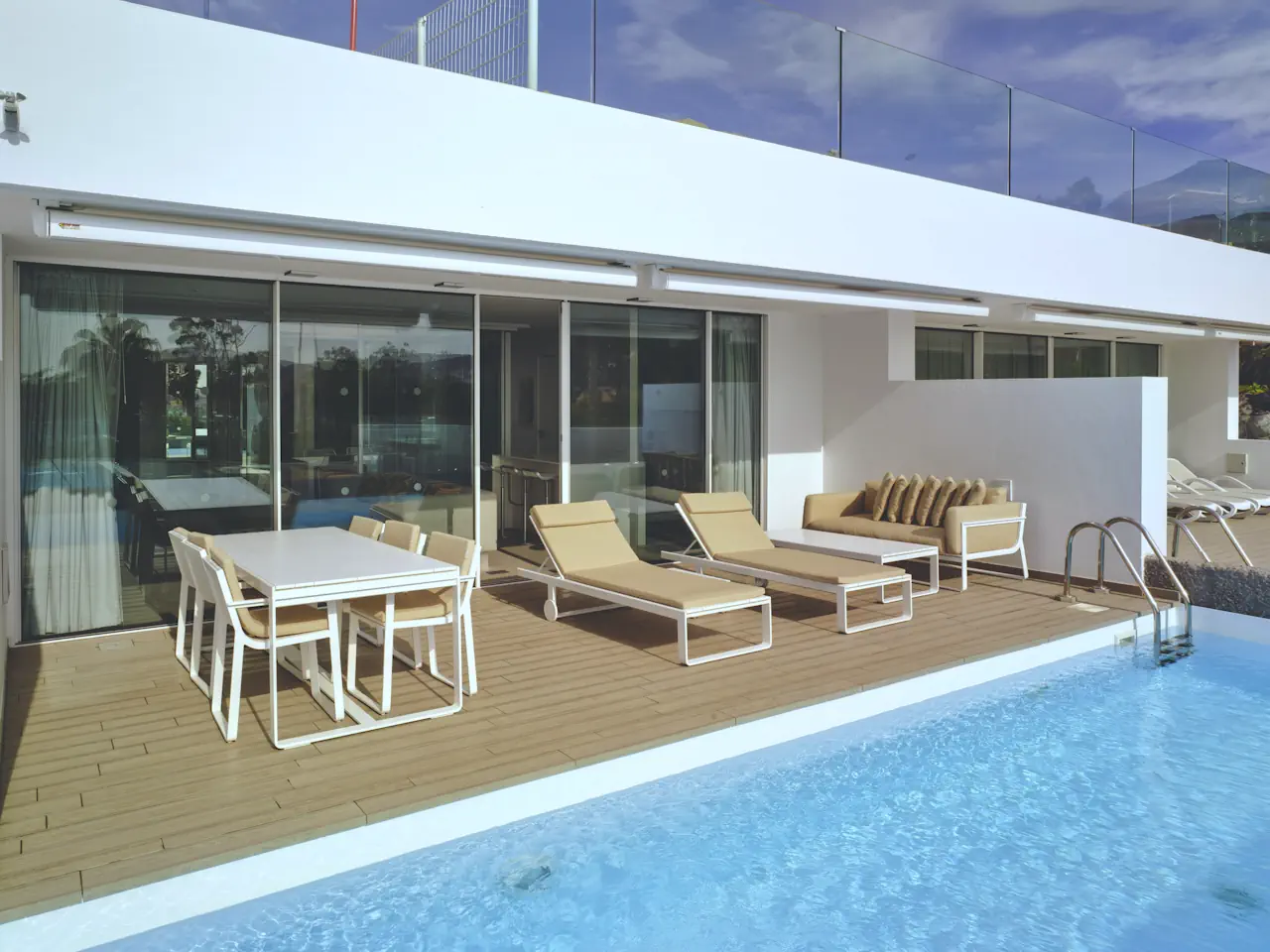
Three or four-panel configurations allow for greater flexibility in how you use your space. You might choose to have all panels slide, or have some fixed and others mobile. Some designs even allow panels to slide in both directions, meeting in the middle when closed. This flexibility means you can customise your aluminium sliding patio doors to suit your specific needs and the layout of your home.
For truly expansive openings, aluminium sliding patio doors can be designed with five, six, or even more panels. These large-scale doors can create a stunning visual impact and are particularly effective in homes with panoramic views or large outdoor entertainment areas. The robust nature of aluminium ensures that even these larger configurations operate smoothly and securely.
Keeping Your Doors in Top Shape
Aluminium sliding patio doors are known for their durability and low maintenance requirements. However, a bit of regular care can keep them looking great and functioning smoothly for years to come.
Cleaning Tips
Keeping your aluminium sliding patio doors clean is straightforward and doesn’t require any special products. For routine cleaning, a simple solution of warm water and mild dish soap works well. Use a soft cloth or sponge to gently wipe down the frames, taking care to remove any dirt or debris that might have accumulated. Rinse with clean water and dry with a soft, lint-free cloth to prevent water spots.
For the glass panels of your aluminium sliding patio doors, a standard glass cleaner or a mixture of white vinegar and water can be effective. Spray the solution onto the glass and wipe with a microfibre cloth or squeegee for a streak-free finish. Don’t forget to clean both sides of the glass for the best results.
The tracks of sliding aluminium patio doors need special attention. Over time, dirt and grit can build up in the tracks, affecting the smooth operation of the doors. Use a vacuum cleaner with a narrow nozzle attachment to remove loose debris from the tracks. For stubborn dirt, a soft brush can be helpful. After cleaning, apply a small amount of silicone spray to the tracks to help the doors glide more easily.
Long-Term Care
While aluminium sliding patio doors require less upkeep than their wooden counterparts, some long-term maintenance can help preserve their appearance and function. Inspect the weatherstripping around the doors annually. If you notice any signs of wear or damage, replace the weatherstripping to maintain the doors’ energy efficiency.
If your aluminium patio sliding doors feature a powder-coated finish, you might notice small scratches over time. These can often be touched up with a matching paint, available from most door manufacturers. For deeper scratches or dents, consult a professional to avoid damaging the door’s finish or compromising its structural integrity.
Lifespan and Durability
One of the key advantages of aluminium sliding patio doors is their exceptional longevity. With proper care, these doors can last for decades without needing replacement. The robust nature of aluminium means it won’t rot, warp, or corrode, even in challenging weather conditions.
Aluminium sliding patio doors are particularly resistant to the effects of UV radiation. Unlike uPVC doors, which can discolour or become brittle over time when exposed to sunlight, aluminium doors maintain their appearance and structural integrity. This makes them an excellent choice for south-facing installations or homes in areas with intense sunlight.
The durability of aluminium sliding patio doors extends to their operation as well. The strength of aluminium allows for larger glass panels without compromising on smooth sliding action. Even after years of use, well-maintained aluminium sliding patio doors should operate as smoothly as they did when first installed.
What to Look for When Buying Aluminium Sliding Patio Doors
Thermal Performance
Energy efficiency is a top priority for many homeowners. Modern aluminium sliding patio doors are designed with thermal performance in mind. Look for doors that feature thermal break technology, which creates a barrier between the inside and outside of the frame to reduce heat transfer. This technology helps aluminium sliding patio doors maintain a comfortable indoor temperature and can lower your energy bills.
U-values are another important factor. The U-value measures how well a door prevents heat from escaping. Lower U-values indicate better insulation properties. When comparing aluminium sliding patio doors, ask about their U-values to ensure you’re getting a product that will help keep your home warm in winter and cool in summer.
Unlike most interior sliding doors, double or triple glazing is standard for sliding aluminium patio doors. Triple glazing offers superior insulation but comes at a higher cost. Consider your climate and budget when deciding between the two. Some manufacturers also offer low-E glass coatings, which reflect heat back into your home, further improving the thermal efficiency of your aluminium sliding patio doors.
Security Features
Look for doors with multi-point locking systems, which secure the door at several points along the frame. This provides much better protection than a single lock point.
Many aluminium sliding patio doors come with toughened or laminated glass as standard. This glass is much harder to break than regular glass, adding an extra layer of security to your home. Some manufacturers offer options for upgrading to higher security glass if you live in an area where this is a concern.
Anti-lift mechanisms are another important security feature in sliding aluminium patio doors. These prevent the door from being lifted off its tracks from the outside, a common method used by intruders. Check that the doors you’re considering have this feature built-in.
Smooth Operation
The ease of operation is a key factor in your day-to-day satisfaction with aluminium sliding patio doors. When viewing door samples, test how smoothly they slide. High-quality doors should glide effortlessly along their tracks, even when fully open.
Pay attention to the quality of the rollers or wheels at the bottom of the door panels. Stainless steel or nylon rollers tend to offer the best performance and longevity. Some aluminium sliding patio doors feature adjustable rollers, allowing for fine-tuning of the door’s operation over time.
The track itself is also important. Look for aluminium patio sliding doors with durable, corrosion-resistant tracks. Some designs feature raised tracks to prevent dirt and debris from interfering with the door’s operation. Others have specially designed drainage systems to prevent water accumulation.
Installation Expertise
Even the highest quality aluminium sliding patio doors won’t perform well if they’re not installed correctly. When choosing a supplier, ask about their installation process and the experience of their installers. Proper installation is critical for the security, energy efficiency, and smooth operation of your doors.
Some suppliers of sliding patio doors offer a comprehensive service, including initial measurement, manufacture, and installation. This can be beneficial as it ensures all aspects of the process are coordinated. If you’re opting for a supply-only service, make sure you have a reputable installer lined up who has experience with aluminium sliding patio doors.
Ask about warranties and after-sales service. A good warranty should cover both the doors themselves and the installation. This can provide peace of mind and protection for your investment in aluminium sliding patio doors.
Aluminium Sliding Doors: FAQs
What are some alternatives to sliding patio doors?
While aluminium sliding patio doors are a popular choice, they’re not the only option for connecting your indoor and outdoor spaces. Several alternatives can offer different benefits depending on your specific needs and preferences.
Aluminium French doors, with their classic double-door design, provide a traditional look and can open fully to create a wide entrance. Bifold doors, which fold back in sections, can open up an entire wall, offering maximum access to your outdoor area. However, a standout alternative that combines the best of both worlds is the aluminium slide and fold patio door system. For a more detailed comparison, see our comparison of French doors vs sliding doors.
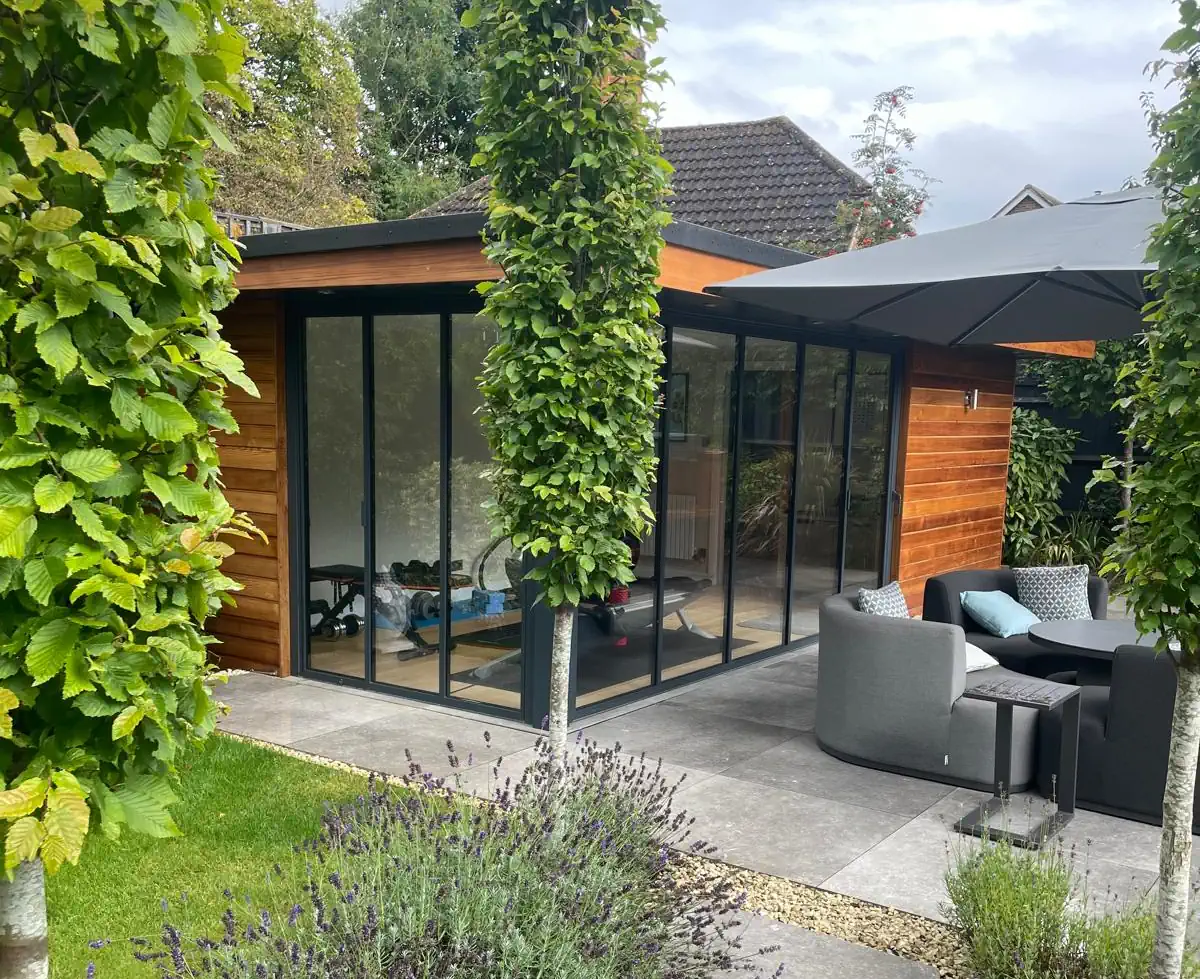
Aluminium slide and fold patio doors, also known as slide and stack or slide and pivot doors, offer unique advantages. Like aluminium sliding patio doors, they feature the strength and slim profiles of aluminium frames. However, slide and fold doors can open up even more of your wall space. These doors slide along a track and then fold to one or both sides, creating an almost unobstructed opening.
The versatility of aluminium slide and fold patio doors makes them an excellent choice for those who want the option to fully open up their space on nice days, while still enjoying the benefits of a sliding door system when partially opened. When closed, they look similar to aluminium sliding patio doors, maintaining a sleek, modern appearance. The strength of aluminium allows for larger glass panels in slide and fold systems, maximising your view and light intake even when the doors are closed.
While aluminium slide and fold patio doors can be more complex to install and may come at a higher price point than standard sliding doors, many homeowners find the added flexibility worth the investment. As with aluminium sliding patio doors, slide and fold systems benefit from aluminium’s durability, low maintenance requirements, and excellent thermal properties when properly designed.
Are aluminium doors cold?
A common misconception about aluminium sliding patio doors is that they might make your home feel cold. In reality, modern aluminium doors are designed with excellent thermal properties. The key is thermal break technology, which creates a barrier between the inner and outer sections of the door frame. This barrier reduces heat transfer, keeping your home warm in winter and cool in summer.
High-quality aluminium sliding patio doors often perform as well as, or better than, doors made from other materials in terms of thermal efficiency. When combined with double or triple glazing, these doors can provide impressive insulation. Look for aluminium sliding patio doors with low U-values of around 1.4 or lower, which indicate better insulation properties. Some sliding aluminium patio doors even exceed building regulations for thermal performance, making them a smart choice for energy-conscious homeowners.
How wide can sliding doors be?
One of the advantages of aluminium sliding patio doors is their ability to span wide openings. The strength of aluminium allows for larger panels than many other materials, giving you the option to create expansive glass walls that blur the line between indoor and outdoor spaces.
Typically, aluminium sliding patio doors can be made with individual panels up to 2-3 metres wide and 3 metres tall. However, by using multiple panels, you can create openings that are much wider. Some systems allow for configurations with six or more panels, potentially spanning the entire width of a room.
It’s worth noting that very large aluminium sliding patio doors may require additional structural support. When planning for exceptionally wide doors, consult with a structural engineer to ensure your home can accommodate them. Despite their size, well-designed aluminium patio sliding doors should still operate smoothly and easily, thanks to high-quality rollers and tracks.
About SunSeeker Doors
With over 20 years of experience, SunSeeker Doors remains at the forefront of door design with our quality-tested patio doors and related products, including the UltraSlim aluminium slide and pivot door system, Frameless Glass Doors, and Slimline Sliding Glass Patio Doors.
To request a free quotation, please use our online form. You may also contact 01582 492730, or email info@sunseekerdoors.co.uk if you have any questions.


